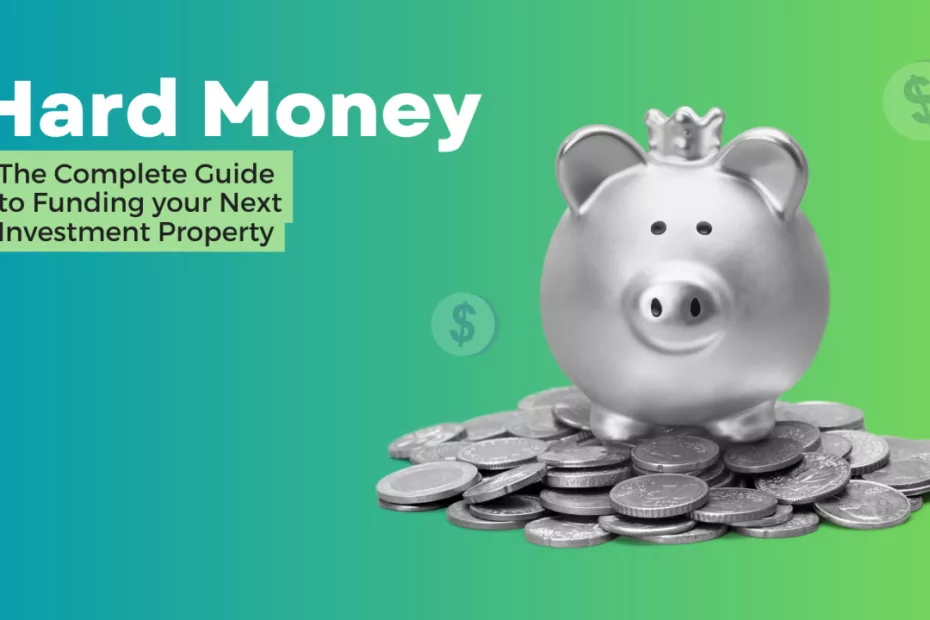Hard money loans are investor-focused loans with no minimum credit score that can be used to flip houses, buy rental properties, or complete a BRRRR project. I’ve been investing in real estate for more than 15 years, and I’ve seen all kinds of hard money loans. I have recently begun loaning hard money myself, and in this article, I’ll tell you everything you need to know.
Hard money loans are short-term, high-interest loans backed by my real estate. They can be funded fast, have few requirements, and don’t rely on the borrower’s credit score or financial situation. If the borrower defaults, they should expect a quick foreclosure.
While conventional mortgage lenders usually have the best rates, a hard money lender is uniquely positioned for use by an investment property owner. Funding time usually beats a local bank, and they work well as a construction loan. The downside is the short-term and high costs. After reading this article, you will know how to decide if hard money is right for you.
Definition: What is a Real Estate Hard Money?

A hard money loan is a loan that is secured by real property. Hard money loans are typically used to finance high-risk real estate transactions, such as flipping properties or buying properties that need renovation.
Hard money lending is based on a hard asset. A private lender would rarely be interested in the borrower’s credit history. Instead, hard-money lenders are primarily concerned with the value of the property.
Hard money lenders are typically private investors or companies instead of banks. This is because traditional lenders are often unwilling to take the risk of making this type of loan. Traditional mortgages from conventional lenders are usually based on the borrower’s creditworthiness and the property’s condition.
Real estate investors are the primary users of hard money lending. A hard money loan is a quick source of hassle-free money used by house flippers or to purchase an investment property. These are often short-term loans with higher interest rates, made by private lenders when a conventional loan is not possible.
Loan Structure
The terms of a hard money loan are negotiable. However, there are some attributes that most hard-money loans share. Keep in mind the borrower and lender can work together to change the terms of the loan.
- Origination fee at the beginning of the loan.
- Interest Rate.
- Monthly payments, which may be interested only.
- Short-term, with a clear exit strategy.
- Balloon payment is due at the end of the term.
A hard money loan is often a good option for higher risk real estate investments. Unlike a traditional loan, the hard money loan often considers the property’s after repair value making it ideal for investment properties that need a significant renovation.
Hard Money Interest Rates

Hard money loan interest rates are higher than a conventional mortgage. They often have interest rates of 10%-18% and an origination fee of 3%-7%.
A Hard money loan usually has higher interest rates than a traditional loan. It’s common for a hard money lender to change as much as 15%, and sometimes it will be higher. In addition, they often come with origination fees of 5% or more.
The higher cost of hard money lending is because the borrowers often have a poor credit history and a small down payment. In addition, in most cases, the investment property will need a large rehab project to realize its ultimate value. This is a higher risk than conventional lenders are willing to take.
Private money lenders are often experienced with renovation projects and local property values and fill the gap left by traditional financing. The high interest rates from a reputable hard money lender can be a good idea for new investors looking for flexible terms that will allow them to complete a real estate investment project.
Hard Money Loan Requirements

The main requirement for a hard money loan is significant equity in the property. It’s typical for hard money lenders to loan 60%-70% of the property value. That equity could be purchased with a downpayment or earned by finding an exceptional deal on the property.
When compared to traditional loans, hard money loans have very few requirements. The borrower’s credit score and financial situation are usually unimportant. These asset-based loans have a few conditions, and those are centered on that asset.
The main legally imposed requirement is that a hard money loan cannot be used for the borrower’s primary residence. The Dodd-Frank Act prohibits private money financing when the property is a buyer’s principal residence unless the loan goes through a licensed mortgage originator.
A hard-money lender will generally be concerned with the asset serving as collateral, the equity in that asset, then the borrower’s plan. The list below summarizes these requirements.
Hard Assets
These types of loans are based on the value of the real estate. As a result, the main requirement of a hard-money loan is a piece of property. The loan is not required to be used to purchase the property, but a valuable asset must serve as collateral for the loan.
Equity
The property must have significant equity. In most cases, at least 30% equity is required, and a hard-money lender may require as much as 50% equity. Unlike traditional mortgage lenders, a hard money lender rarely requires a downpayment. Equity is essential, but how that equity is obtained is irrelevant. This shouldn’t be a problem if you follow the process I outlined when teaching precisely what to pay for an investment property.
A Plan
A hard money lender will often want to know the borrower’s plan with the loan. Their concern is collecting the monthly payments and the balloon payment due at the loan’s end. However, most hard money lenders need to understand the exit strategy.
Do Hard Money Loans Require an Appraisal

Hard money loans do not require an appraisal. However, all hard money lenders must determine the property value somehow. This may be with an assessment, a broker price opinion, or personal knowledge of the area.
A mortgage from a traditional bank will require an appraisal. This requirement is imposed by federal law, and each lender must follow specific rules and regulations when selecting an appraisal. As a result, an appraisal is a prime component of conventional mortgage loans.
The loan amount of private money loans is based on the asset’s value. A hard money lender familiar with the area may set the home’s value based on personal experience. On the other hand, if the direct lender is unfamiliar with the area, they will often need a more formal process to set the property’s value.
A full appraisal is the most formal way to ascertain the value of a property. A real estate appraisal is a professional opinion of the value of a property. They are conducted by licensed or certified appraisers who have extensive training and experience in real estate valuation.
Another option for setting the property value is a broker price opinion (BPO), which is less expensive than a formal appraisal. A BPO is an estimate of the value of a property provided by a licensed real estate broker or agent. In contrast with a formal appraisal, a BPO is typically less detailed and may rely on fewer data sources.
What Happens if you Default on a Hard Money Loan

If you default on a hard money loan, the lender will foreclose on the property. In most cases, foreclosure will happen quickly if a monthly payment is missed or the other terms of the agreement are violated.
A hard money loan is based on a physical asset that serves as collateral. As a result, the borrower usually has a low credit score and a high risk of default. If the borrower defaults on the loan, the hard money lender is ready to take the property to recoup any losses.
In the case of default, a hard-money lender will take possession of the property as soon as possible. In most cases, they will sell the property quickly, and the low amount loaned relative to the property value will usually allow them to recoup any losses. Sometimes, the borrower will receive any funds from the sale in excess of the balance owed, but this is not guaranteed in all hard money agreements.
If the borrower has gotten an excellent real estate deal, they should have plenty of equity even if they didn’t contribute a down payment. If the borrower cannot fulfill the contract terms, selling the property quickly and avoiding foreclosure is prudent. This is another reason that getting a great deal is essential to being a successful real estate investor.
Pros and Cons of Using Hard Money

| Traditional Bank | Hard Money Lender | |
| Interest Rate | 5.5% – 8.5% | 12%-18% |
| Origination Fee | 1% of the loan balance | 5% of the loan balance |
| Typical Term | 30 years | 12 months |
| Time to Fund | 45 days | 5 days |
| Minimum Credit Score | 620 | none |
| Number of Mortgages Limit | 10 | none |
Pros of Hard Money
- Value Drive the Decision. Hard money lenders aren’t required to follow the same regulations as traditional lenders. Instead, they make their decisions based on the attribute of deals in place of a borrower’s credit score and debt-to-income ratio.
- Fund Fast/Close Fast: Hard money loans will funder faster than a traditional loan, sometimes as short as same-day funding. As a result, a real estate investor can close quickly and avoid complications.
Cons of Hard Money
- High-Interest Rates. Hard money lenders typically charge higher rates and fees.
- Short Term. The term for hard money lending is much shorter than traditional loans. A conventional mortgage typically can be repaid for up to 30 years, while hard money loans often require repayment in one year.
Conclusion
Hard money loans are short-term loans secured by real property and often used to finance high-risk real estate transactions, such as flipping or buying properties that need renovation. Real estate investors primarily use them, and the lenders are typically private investors or companies.
Hard money loans are based on the value of the property rather than the borrower’s creditworthiness, making them ideal for those with poor credit. They have higher interest rates and fees than traditional loans and require significant equity in the property. They do not require an appraisal, but the property value must be determined by some means.
A hard money loan is based on the underlying asset value. As a result, hard money lenders are often quick to foreclose on a property when the agreement’s terms are not met. However, the borrower’s equity situation should enable them to sell a house before a foreclosure can be completed.
A hard money borrower should expect a double-digit interest rate and a significant origination fee, often around 5%. In return, the loan will fund quickly, and interest-only payments are often available. This type of loan is costly, but it has its place in the real estate investment world.




